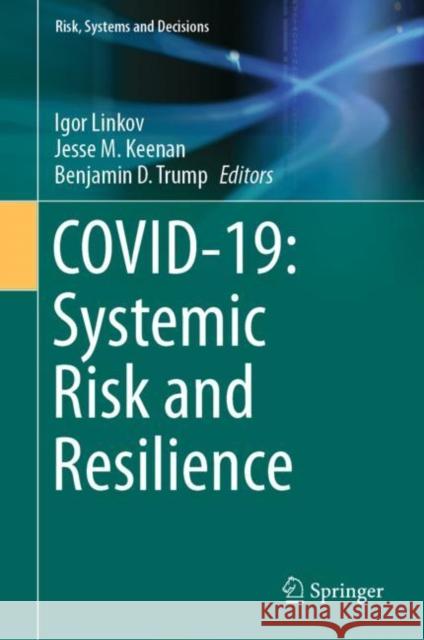Covid-19: Systemic Risk and Resilience » książka



Covid-19: Systemic Risk and Resilience
ISBN-13: 9783030715861 / Angielski / Twarda / 2021 / 440 str.
Covid-19: Systemic Risk and Resilience
ISBN-13: 9783030715861 / Angielski / Twarda / 2021 / 440 str.
(netto: 536,72 VAT: 5%)
Najniższa cena z 30 dni: 539,74
ok. 16-18 dni roboczych.
Darmowa dostawa!
Multi-disciplinary Perspectives on Systemic Risk and Resilience in the Time of COVID-19.- Ten Strategies for Leadership During COVID-19: A Plan of Action for Decision Makers in Times of Critical Change.- Some elements of analysis of the bibliography on risk and resilience on COVID-19.- Real-Time Anticipatory Response to COVID-19: A Novel Methodological Approach.- Complexity, Interconnectedness and Resilience: Why a paradigm shift in economics is needed to deal with COVID-19 and future shocks.- Enhancing current practice from the natural and manmade hazards domain to pandemic: Insights from the Italian case.- Value-based optimization of healthcare resource allocation for COVID-19 hot spots.- Overview of preventive measures and good governance policies to mitigate the COVID-19 outbreak curve in Brunei.- Precarious Aging: COVID-19 Risk, Resilience and Response.- The Impact of “Flatten The Curve” on Interdependent Economic Sectors.
Dr. Jesse M. Keenan is an Associate Professor of Real Estate and social scientist within the faculty of the School of Architecture at Tulane University in New Orleans, Louisiana. Keenan’s research focuses on the intersection of climate change adaptation and the built environment, including aspects of design, engineering, regulation, planning and financing. Keenan has previously advised on matters concerning the built environment for agencies of the U.S. Government, governors, mayors, Fortune 500 companies, technology ventures, community enterprises and international NGOs. Keenan formerly served as the Area Head for Real Estate and Built Environment on the faculty of the Harvard Graduate School of Design; Fellow of Science, Technology and Public Policy at the Harvard Kennedy School of Government; and, as the Research Director of the Center for Urban Real Estate on the faculty of the Graduate School of Architecture, Planning and Preservation at Columbia University. Keenan is currently a Visiting Scholar at the Perry World House at the University of Pennsylvania. Keenan is the author of NYC 2040: Housing the Next One Million New Yorkers (Columbia University Press, 2014) and Climate Adaptation Finance and Investment in California (Routledge, 2018), which was awarded Amazon's 'Best Of' Award for "The Best Business and Leadership Books of 2018."
Keenan is the co-editor of the books, Blue Dunes: Climate Change by Design (2nd Edition)(Columbia University Press, 2017), North American Climate Adaptation: Fostering Resilience and a Regional Capacity to Adapt (Springer, 2017), and Managing Climate Risk in the U.S. Financial System (CFTC, 2020). Keenan is the also the co-author of a variety of design research monographs, including, Mobility Oriented Design: The Case for Miami’s Metrorail (Office of Urbanization, Harvard Graduate School of Design, 2019); Adapting Miami (Harvard Graduate School of Design, 2020), and Multiple Miamis (Harvard Graduate School of Design, 2020). Keenan serves as Of Counsel to the law firm of Hinshaw & Culbertson, LLP and as an advisor to Silicon Valley technology firm of Jupiter Intelligence. Keenan holds degrees in the law (J.D., LL.M.) and science (M.Sc.) of real estate and the built environment, including a Ph.D. From the Delft University of Technology.This book aims to provide a collection of early ideas regarding the results of applying risk and resilience tools and strategies to COVID-19. Each chapter provides a distinct contribution to the new and rapidly growing literature on the developing COVID-19 pandemic from the vantage points of fields ranging from civil and environmental engineering to public policy, from urban planning to economics, and from public health to systems theory. Contributing chapters to the book are both scholars and active practitioners, who are bridging their applied work with critical scholarly interpretation and reflection. The book's primary purpose is to empower stakeholders and decision-makers with the most recent research in order that they can better understand the systemic and sweeping nature of the COVID-19 pandemic, as well as which strategies could be implemented to maximize socioeconomic and public health recovery and adaptation over the long-term.
1997-2026 DolnySlask.com Agencja Internetowa
KrainaKsiazek.PL - Księgarnia Internetowa









